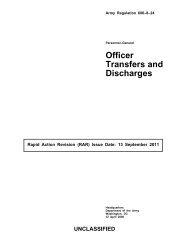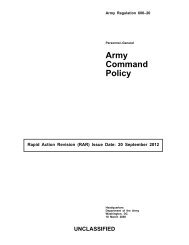Patient Administration - Army Publishing Directorate - U.S. Army
Patient Administration - Army Publishing Directorate - U.S. Army
Patient Administration - Army Publishing Directorate - U.S. Army
Create successful ePaper yourself
Turn your PDF publications into a flip-book with our unique Google optimized e-Paper software.
the emergency. The patient or responsible Family member will be informed of this and will be advised that arrangements<br />
should be made with a civilian hospital that participates in the Medicare Program so that the patient can be<br />
transferred as soon as his or her condition has improved to the extent that he or she can be moved. Emergency<br />
hospitalization of SSA beneficiaries will be reported for reimbursement to the appropriate financial intermediary on DD<br />
Form 7/7A along with a CMS 1450 (UB-04)(Uniform Bill). Amounts unpaid by the financial intermediary will be<br />
collected from the patient. This paragraph does not apply to Family members and retired members and their Family<br />
members who are beneficiaries under the provisions of sections III and IV of this chapter. The CMS 1450 (UB-04)<br />
may be obtained from the nearest local Health and Human Services Health Care Financing <strong>Administration</strong> or accessed<br />
at http://www.cms.gov/.<br />
3–35. Micronesian citizens<br />
Pacific Island Nation citizens covered by the Compact of Free Association and referred by their governments to TAMC<br />
for specialized treatment may be provided hospitalization and outpatient treatment. Pacific Island governments will be<br />
billed at interagency rates or at rates established by the commander of TAMC according to the Compact of Free<br />
Association. Because of historical status as Trust Territories of the Pacific Islands, payment guaranteed by governments<br />
of Pacific Island Nations will be treated as reimbursement source code 899, “all other Federal agencies outside DOD.”<br />
3–36. American Samoan citizens<br />
Citizens of American Samoa referred by the Governor of American Samoa to TAMC for specialized treatment may be<br />
provided hospitalization and outpatient treatment as beneficiaries of the government of American Samoa at rates<br />
specified in appendix B. Collection will be made locally.<br />
Section VIII<br />
Miscellaneous Categories of Eligible Persons<br />
3–37. Secret Service protectees and protectors<br />
Secret Service protectees and protectors are authorized care in <strong>Army</strong> MTFs. Applicable charges are addressed in<br />
appendix B, table B-1.<br />
3–38. Persons in military custody and nonmilitary Federal prisoners<br />
a. Enemy prisoners of war and other detained personnel. Members of the enemy armed forces and other persons<br />
captured or detained by U.S. Armed Forces are entitled to medical treatment of the same kind and quality as that<br />
provided U.S. Forces in the same area. Detainees suffering from serious injury or disease necessitating special<br />
treatment or hospitalization will be medically evacuated to the military or civilian medical unit where such treatment<br />
can be given. When civilian hospital facilities are not available, or their use is not feasible because of operational or<br />
security considerations, U.S. MTFs will be utilized for the medical treatment of civilian internees or other civilians<br />
injured, wounded, diseased, or ill as a result of enemy or allied actions. Ambulatory detainees will be transferred to the<br />
nearest detainee collecting point or prisoner of war/civilian internee camp when the need for special medical care has<br />
been fulfilled. Other civilians may be released or transferred to the nearest civilian medical facility as the patient’s<br />
medical condition permits (AR 190-8, DA Pam 27-1, and the 1949 Geneva Convention, Article 122 and Article 138).<br />
b. Military prisoners.<br />
(1) Military prisoners whose punitive discharges have been executed but whose sentences have not expired are<br />
authorized all necessary medical care.<br />
(2) Military prisoners whose punitive discharges have been executed and who require hospitalization beyond<br />
expiration of sentences are not eligible for care but may be hospitalized as pay patients until disposition can be made to<br />
some other facility.<br />
(3) Military prisoners on parole pending completion of appellate review or whose parole changes to an excess leave<br />
status following completion of sentence to confinement while on parole are members of the military services.<br />
Accordingly, they are authorized medical care to the same extent as other Soldiers. An individual on parole whose<br />
punitive discharge has been executed is not a member of the military services and is not eligible for care in <strong>Army</strong><br />
MTFs. However, in exceptional circumstances, care in <strong>Army</strong> MTFs may be requested under the provisions of Secretary<br />
of the <strong>Army</strong> designee in paragraph 3-50. (Additional details are contained in AR 190-47.)<br />
c. Nonmilitary Federal prisoners. Such persons are authorized only emergency medical care. When such care is<br />
furnished, the institution to which the prisoner is sentenced must furnish the necessary guards to control the prisoner<br />
and prevent his or her escape. Under no circumstances will military personnel be utilized to guard or control the<br />
prisoner. Upon completion of emergency medical care, arrangements for transfer to a nonmilitary medical facility or<br />
return of the prisoner will be made with the appropriate official of the institution to which the prisoner is sentenced.<br />
Charges for emergency medical care will be collected from the authorizing institution by submitting DD Form 7/7A<br />
and SF 1080.<br />
AR 40–400 27 January 2010<br />
25
















